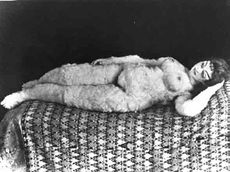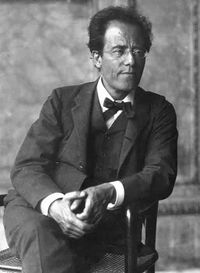Gustav Mahler
“Less is more? No way!”
– Gustav Mahler on composition technique
“I am thrice homeless, as a bohemian, as an Austrian, and all over the world, you guessed it right I am Jewish”
– Gustav Mahler
“My time will come, that is: after the finish of the recurring song cycles”
– Gustav Mahler
“Whatever you do, please don't let my wife Alma proof read my scores.”
– Gustav Mahler
“Do not come in, Herr Cooke. It is not yet finished.”
– Alma Mahler on Gustav Mahler's Tenth Symphony
Gustav "Karen" Mahler (7 July 1860 – 18 May 1911) is considered to be the most successful composers of all time, an accolade firmly shoved on his head by his apprentice and spiritual heir Dmitri Shostakovich. He wanted his audience to experience music from the inside out, cooking them like a musical microwave until their ears literally burned off. To others he was 'the emo kid'[1]
Overture[edit | edit source]
To understand Mahler you need a few spare weeks to listen to his music. His works which are definitively long and drawn-out (with little or no content to keep the audience's attention) are extremely whiny and shrill, and have been known to cause Sudden Ear Bleed Syndrome. In a scrappy note to a long-term friend Anna von Mildenburg, Mahler once cited:
- “I find my work draws great parallels with the music of Steve Reich, Philip Glass and other members of the 20th century American minimalist movement. All our work is characterized by recycled material but there is a big difference - me. Their motifs gradually grow and thicken like a week year old fungus at the bottom of a coffee cup, whereas mine focuses on not very much, and when material does appear, it is usually phrases from my previous works, or folk music that I’ve nicked from somewhere else, as I’ve run out of ideas.”
Despite the modern label of “emo”, which he apparently disapproved of, and the musical flaws, Mahler is still recognized as a genius, and one of the greatest composers of the late 19th to early 20th century. Like other major historical and cultural figures who have received a disproportionate amount of recognition and commercial merchandise tie-ins like, Mahler would have been very well off for calendars, tea towels, coasters and novelty spoons. But for real money, he had to die and let his wife collect Mahler's life insurance.
Life[edit | edit source]
Childhood and Education[edit | edit source]
Mahler was born on 7 July 1860 in Iglau,[2] Austro-Hungarian Galactic Empire. The son of a professional soprano singer and an amateur crook, many music theorists have speculated that these two influences sealed his fate as a thieving midget who stole folk-song melodies spanning back centuries in an attempt to pass them off as his own, often transforming them to the minor mode to disguise the original source. The lively “Frère Jacques” funeral march in the third movement of the First Symphony is perhaps the most blatant example of such trickery, and offers a distinctive foreshadowing of his later advanced emo style. Another example, although not based in folk music, is found in the last two notes of the final cadence of this same symphony. Mahler had photocopied Beethoven's score and pasted the excerpt directly into his own manuscript.
Mahler's first instrument was the accordion, as per local tradition, but he quickly realized that he would never attain his childhood dream of becoming a martyr if everyone hated him for his instrument, so Mahler took up the piano instead. People were so relieved by this decision that little Gustav was offered a full scholarship to study piano and composition at the Vienna Conservatory in Salzburg. This seemed apt to his critics, Mahler would be playing in an upmarket greenhouse for an audience of tomatoes.
While at the Conservatory, Mahler won competitions for his solo piano playing, original composition, and track-and-field hammer throw, but generally earned crappy grades for having illegible handwriting, for staring out the window during class, and for not being long-winded enough yet for teacher Anton Bruckner. During his years as a student, Mahler was often disciplined for his violent conduct. This sadism would later show up in his (slightly more) mature music to help shape his distinctive emo sound.
Early career[edit | edit source]
Following graduation, Mahler realized that he had evolved a distinctive arm-waving technique from all his hammer-wielding, so he decided to have a shot at being a conductor. His first gig was at a small German opera house, where he was chosen on the basis that they had a shallow orchestra pit and Mahler was the only candidate short enough to stand in it and not get in the way of the action on stage. He nevertheless proved his ability to act scary and gained the respect to produce each opera to his own very exacting criteria. Mahler ended up accepting conducting jobs all over Europe, and he insisted that all operas be sung in the language of whatever country he was in at the time, regardless of his own understanding of the language.
While on tour, Mahler had many failed relationships with sopranos. He fell for them due to their beauty of voice and spirit, but he never had any interest in going further than that, no matter how much they wanted to. One such situation left Mahler pining over a singer who found another man because she wanted to do it; this inspired his early song cycle Songs of a Hitchhiker, since said soprano and her new boyfriend chased Mahler out of town because he kept asking why she didn't like him anymore.
This unhappy affair left Mahler looking for another job. He rejected an offer in Finland because the language scared him far too much for him to direct operas in it, so he figured, what the wiener schnitzel, why not go for the big bratwurst of all jobs, the Directorship of the Vienna Vienna Court Opera House? The administration in Vienna rejected Mahler on the spot because he was Jewish (and because Mahler had no experience with sausage-making), so he ran into the local bargain store, bought a rosary, showed back up for an audition, and was accepted. To this date, musicologists make a much bigger deal of Mahler's “conversion” than it ever meant to him.
The Vienna Years[edit | edit source]
The very shortness that won Mahler his first conducting job earned him a reputation as a tyrant in Vienna, since he could not be seen from the pit and thus had to scream and stomp as loudly as possible to give direction to the singers. Incidentally, his work with the Vienna Opera Orchestra was very formative to his style of orchestration.
During the opera season, Mahler would lead many outstanding performances of masterpieces from Wagner to Puccini to Tchaikovsky, which influenced the length of his own pieces. In the summers, he would run off to secluded patches of lakeside forest, where Mahler would have tiny huts constructed in which to compose, because the claustrophobia reminded him of the inspiration he achieved on the roof of his childhood home, which was a hole in the wall inhabited by large rodents who pretended to like his music to get in with the popular crowd. Mahler would complete a symphony roughly every two years, and then inflict it on the Vienna Philharmonic for rehearsals during the next season, only to grant the premiere to another unsuspecting city that had utterly no clue what it was in for.
In the middle of his Viennese career, Gustav Mahler met Alma Schindler, the daughter of the famous landscape cinema usher Steven Von Spielberg . Alma aspired to be a composer herself in addition to already being a professional seducer of the stars. She also admitted to liking 'lists' - though Mahler misheard this as Franz Liszt, one half of the brewing dynasty Brahms and Liszt. Shortly beforehand, Mahler had nearly died of an embarrassing medical condition that I'm sure he would prefer not to have discussed, so this near-death experience brought to his attention that if he wanted a family, he'd better get busy. Suffice it to say that after a life-saving operation, Gustav could not sit down for at least a week.
So he fell head-over-heels for the beautiful Alma, and after making it clear to her that not only was she no longer allowed to compose love songs to other famous people, but she would no longer compose at all, the two married. It was at this point that it became clear to Mahler that he actually had no idea where babies came from, since he'd spent so much time hiding from his parents and siblings as a child. Alma showed him what to do by drawing numbers on her body, and within three years Mahler had become the proud father of two beautiful daughters.
For the first few years of the 20th Century, all was going so well in Mahler's life that he compensated by writing the darkest of his symphonies and songs to counter these feelings. Most notable among the works completed then is the Sixth Symphony. The hero in this piece goes from bad to worse, and in the end gets pounded into the earth by three blows of a hammer. Originally Mahler was okay with this, as the specific instrumentation was devised so that Mahler would be able to pull out his old track-and-field equipment, but the more he rehearsed the piece, the more Mahler got into the idea that the he was the hero of the symphony and these hammer blows were attacking him and belonged to the Fates. In a crying fit of superstition and paranoia, Mahler edited out the third blow with red Sharpie, so as to prevent this death blow from befalling him. To this date, musicologists also debate on whether this was done emotionally or to aide the structure of the piece.[3]
Then, 1907 happened and Mahler didn't have to make up the angst anymore, particularly since removing the third hammer did diddly squat. First, he lost the rosary and the administration of the Vienna Court Opera suddenly noticed that Mahler was still Jewish, and used this as an excuse to mock him cruelly in the newspapers. Unable to take this, Mahler resigned and returned his baton stuffed inside a stale salted beef schnitzel.
Next, Mahler's older daughter seized up and died. The cause was originally thought to be malaria, but it was later discovered to be caused by a hex that Alma placed on her because she was so convinced that Mahler's Kindertotenlieder (Songs to Kill Children By) cycle, which Mahler wrote to confront the fear of losing a child, was a bad idea. Mahler spazzed out so intensely after this incident that he literally burst a hole in his heart, and the discovery of this defect meant he had to take things easier than he was used to.
The Final Years[edit | edit source]
After the events of 1907, Mahler was convinced that he was going to die very shortly, so he took it upon himself to postpone that as long as possible. He did this by stalling on writing his Ninth Symphony. It is a well established statistically significant fact that Ninth Symphonies — particularly long ones with slow bits — kill composers, so Mahler stealthily dodged the issue by following his Eighth with his Eight-and-a-Halfth, Eight-point-Seventh, Square-Root-of-80th, and The Song of the Earth (subtitled “A Symphony”).
Between working on these fractional symphonies, Mahler moved to New York to conduct the city's Metropolitan Opera. Little did he know that being in New York gave Alma more opportunity to sleep around with more famous people. She had been doing this all the time in Vienna too, but Americans are far more gossipy than Austrians are. Therefore, it was only at this point did Mahler catch wind, after overhearing the harp player talking about how he'd snogged a hot babe who was actually the mistress of architect Walter Gropius, who Mahler noticed had stowed away on the boat from Vienna to New York along with his family. Instead of firing the harp player and ditching Alma, Mahler embarked on his Ninth Symphony as a plea for Alma's love, a chance to bribe the harp player with a good part, and as something of a suicide note as well.
At some point in all this mess, Mahler became so desperate for relief from his existential pain that he went to infamous psychoanalyst Sigmund Freud for help. Freud assured Mahler that everything came to pass as it did because Mahler clearly fancied his mother. After this visit, Mahler became obsessed with all things medical, to the point of appearing on an episode of the now defunct ER. These obsessions did not, however, save him from his ultimate fate: hearing his own music being performed live. And sometimes he even had to conduct.
Decomposition[edit | edit source]
The completion of the Ninth Symphony weakened the physical structure of Mahler's heart so intensely that he contracted some sort of disgusting infection from the streets of New York the second he decided to try writing a Tenth. He had just enough strength to make it through the boat ride back to Vienna before decomposing dramatically in the middle of a thunderstorm on 18 May 1911. His last known words (besides "Rosebud" and "Flaps full, we're not gonna make it") were said to Alma on his deathbed, located outside in the pouring rain.
Some musicologists theorize that Mahler would have survived longer if the doctor who was supposed to be saving his life hadn't been screwing Alma. But in his final moments, Mahler reconciled with his wife by telling her "I want my Mozart CD back!", which Alma then reported as "Mozart!, Mozart!!" for all posterity.
As far as the uncompleted Tenth goes (or went), it is now generally accepted that Alma not only proof-read all of Mahler's scores, but that she also completed the last one in a cleverly conceived forgery of Mahler's handwriting. This would seem to explain why Alma took so long in granting Deryck Cooke the right to 'complete' the work. It is the music of Alma Mahler which millions of Mahler aficionados whistle to on the way to work (or court), thus guaranteeing her a spot in the pantheon of mediocre composers.
Alma's Subsequent Career[edit | edit source]
It is related that about 1910 Alma returned to the house to hear Gustav playing some of her old Lieder manuscripts at the piano. He raved about their virtues and urged her to resume composing. In New York Alma met promoters who got her in touch with American educational authorities seeking help in supplying slow boring school songs to be played at half-time (or do you say in half time) at football games as an antidote to the maniacal Fight Songs of which each school possessed at least one. One smarmy devotional Liebeslied had to be written for each high school and college as well as many elementary schools.
During the 1930s many such works were shipped over from Austria and after 1940, when Alma and Franz Werfel bought a house in California, a veritable song factory was set up where Alma and her assistants produced over 17,984 slow boring school songs which have acquired the generic name "alma mahlers", also applicable to the work of her many imitators. It is sobering to think that if she had not married Mahler these things might all now be referred to as Alma Schindler's.
Music[edit | edit source]
Gustav Mahler was not a terribly prolific composer in terms of number of completed works, but the number of minutes of music thoroughly overcompensates for this. Stuffed full of musical notes and dynamics, conductors have to be careful not to include more than the recommended number of players when performing a Mahler symphony. Otherwise, the orchestra would exceed a critical mass and cause a classical music black hole. Perhaps this was deliberate, especially in Austria and Germany where orchestral overmanning was endemic. This would have certainly appealed to Mahler's own predilections for revenge on the antisemitism he had experienced in Vienna.
Musicologists are divided into two opposing camps regarding the division of Mahler's work. Some argue that his output can be divided into three main periods. Though these three are all very distinct from each other, they are all characterized by elements of nature, a healthy dose of psychological and spiritual contemplation, ample virtuosities in Mahler's instrumental writing, constant interruption of one theme into each other, a couple of metric tons of neuroses, and a dash of salt. Other Mahler experts think this analysis is all balls and believe the composer was just basically winging it as he went along.
However, in many current textbooks, the three periods are further sub-divided as such (the alternative period-breakdown is found in the section below):
- The Early Period — includes the first two movements of Mahler's 1st symphony.
- The Middle Period — includes the remainder of the 1st symphony.
- The Second Middle Period — includes the first half of the first movement of the 2nd symphony.
- The Third Middle Period — includes the second and third movements of the 2nd symphony.
- The Fourth Third (middle) Period — includes the remaining sections of the 2nd symphony.
- The Fifth Third Period — includes the first sixty-fourth of the first movement of the 3rd symphony.
- The Sixth Third Period — includes the next third of the first movement of the 3rd symphony.
- The Seventh Third Period — includes the final sections of the first movement of the 3rd symphony.
- The Late-Middle Period — includes almost all of the second movement of the 3rd symphony.
- The Second Late-Middle Period — includes the last bits of the second movement and the first part of the third movement of the 3rd symphony.
- The Third Late-Middle Period — includes the rest of the third movement of the 3rd symphony.
- The Fourth Late-Middle Period — includes the entire fourth movement of the 3rd symphony.
- The Fifth Late-Middle Period — includes the fifth movement of the 3rd symphony.
- The Sixth Late-Middle Period — includes the first fifth of the first fourth of the sixth movement of the 3rd symphony.
- The Seventh Late-Middle Period — includes the entire second fifth of the sixth movement of the 3rd symphony.
- The Late Period — includes the third fifth of the sixth movement of the 3rd symphony.
- The Second Late Period — includes the final sections of the sixth movement of the 3rd symphony.
- The Third Late Period (immediately after the first time he got laid by Alma, so he was pretty energetic) — includes all the rest of his works.
The Early Period[edit | edit source]
Mahler's early work is characterized by actually being happy, or by writing about sad or demented things in a way that still sounds happy. There are cheerful and fast melodies used to describe war, and militaristic melodies used to describe happy forest creatures playing in the Alpine meadows. Said Mahler, "My vision for my early symphonies was to epitomize the life of the central figure, being, me, of course. This Hero, he streaks through the forest, jumping on mushrooms, beating the forest creatures with his boot. In my symphonies, you can hear as the Hero actually touches the Golden Coins in the Sky." Clearly, Mahler was thoroughly psychotic at this point.
Most of Mahler's early output consisted of songs, which he then ripped off in his own symphonies. The average length of a piece at this time was still under an hour, and the orchestra size was still practical on a moderate payroll.
The Middle Period[edit | edit source]
On the other hand, Mahler's middle period is characterized by actually being angsty and depressing, or by happy or pleasant things composed in a way that makes them sound angsty and depressing. Around this time, he received his first descriptions involving the word “emo”, which he disapproved of and consequently made him more upset. The orchestration becomes more complex and the melodies more fragmented between instruments. Mahler chose to go this direction because he was tired of being so assuredly good at his early style and felt like adopting a new manner of composing at which he would feel like a total amateur.
His new orchestration techniques involved an awful lot of pissing about with weird percussion “instruments”. Regular old drums were simply not good enough for Mahler anymore, so he decided to go out to his garden shed and write all of that stuff into a piece, including a pile of old sticks, a broken Firebolt broom, and his cherished childhood hammer. He did not need more cowbell as most sentient beings do, but he did forget the motor horn altogether.
At this point, Mahler's concentration shifted more from songs to symphonies. The average length of a piece ballooned to nearly an hour and a half, and the orchestra payroll suddenly became quite strained in that many of these works required hiring rabbits to play and reproduce in order to create more players in time for the last movement.
The Late Period[edit | edit source]
Mahler's late music is supposed to feel sad, contemplative, resigned, and transcendent, and it actually sounds that way, too. To the average listener, this music sounds very melodic and highly emo, but something about the push and pull of harmony contained a subliminal message that caused Arnold Schoenberg to flip out and start writing whacked-out atonal music, all the while giving Mahler the credit and/or blame. At the time of the premiere of the Eighth Symphony, an audience member fell down somewhere in between the screaming of the choruses and the pounding of the drums and was rushed to the hospital and diagnosed with Sudden Ear Bleed Syndrome.
This period consists entirely of symphonies, because the symphonies and their respective orchestras became so huge that they devoured the songs whole. Since you are what you eat, though, these symphonies still sound like really, really long songs. The average length is still pushing an hour thirty, but the payroll has gone down again, both because Mahler had taken an interest in chamber music and because the stage manager was really sick of sweeping up rabbit doots after each concert.
The Mahler Effect[edit | edit source]
In 2003, musicologist Ph.D. candidates at Harvard University successfully tested and proved the long-speculated “Mahler Effect”, albeit under little to no professional supervision. This condition has been described by the team as “an utterly total loss of contact with reality and a heightened sensitivity to lush, emotionally-charged brass passages due to prolonged periods of predominantly Mahlerian aural stimulation through headphones or loudspeakers.” In fact, studies indicate that those who have listened to Mahler for at least five days a week per week over a period of three years will openly cry at random times, even when not being aurally stimulated by Mahler at that moment. Some experts go as far as to suggest that Mahler spawned the “Emo Craze“ of the early twenty-first century, and even served as a harmonic basis for the early emo bands. One thing for certain is that Mahler has always struck a nerve of passion in adolescent musicians, which, in some cases, can lead to a long period of social withdrawal, and a long-term obsession with Mahler, and Mahler alone. In recent years, Mahler has acquired somewhat of a cult following, spawning a healthy stream of Mahler-related literature, including the controversial erotic literature series, “Baby, this Time I've Got More than Two Timpani for You to Bang On.”
In 2006, many students at Juilliard began reporting strange behavior from one of their classmates.
- “Man, it was like, like he’d just start flailing his arms around all over the place, man, and he’d just start gruntin’ maaaan, and singin’ and yellin’ in German and shit, and maaan we thought he was goin’ crazy or somethin’ maaaaaan, like he'd start killin’ us or something maaaan!”
These, among other claims led to a full-scale investigation by a team of psychological experts led by the ghost of Sigmund Freud, who had been resurrected during a seance-performance of the Second Symphony. When they inspected his iPod, they were astounded at what they found. “It's like… it’s like he paid 800 dollars… and bought the entire Mahler selection on iTunes!” Over 53 of the entire 60 GB storage space had been filled, and filled entirely, with Mahler. Further investigations led to a full inspection of his dorm room. Under his mattress, they discovered the complete symphonies of Mahler in full score, and even more ominously, what appeared to be a conductor's baton, painted red with what is believed to be his own blood. His condition is now generally believed to be an extreme case of the Mahler Effect.
It is well known that the first and most prolonged historical victim of the Mahler Effect (prior to the first diagnosis of the disease, of course) was Shostakovich, who was so profoundly moved by Mahler that he even dedicated his entire life to reproducing the Mahler Effect in his own symphonies. Musicologists today are beginning to categorize a new Shostakovich Effect, similar to the Mahler Effect, with several minor differences including the singing and yelling in Russian instead of German, and a severe paranoia for being shot or arrested.
List of Works[edit | edit source]
- Piano Quartet, in one and a half movements, for three instruments: violin, piano, and theremin. Makes a lighthearted guest appearance in Scorsese's "Shutter Island."
- Das Klagende Lied, a.k.a. The Klingon Drinking Song, Cantata for orchestra, choir, and depressed teenage soloists.
Songs[edit | edit source]
- Drei Frühen Lieder, a.k.a. Three Early Songs, for tenor and piano, not to be performed after noon.
- Five Humoresques, on serious subjects, for voice and piano
- Lieder eines galaktischen Anhalters, a.k.a. Songs of a Hitchhiker, for baritone (or gender bending mezzo-soprano) and Sun Ra Arkestra.
- Lieder aus “Des Knaben Wunderhorns”, a.k.a. Songs from “The Youth’s Magic Horn,” a.k.a “The Horny Kid”, for voice and piano or orchestra. (This was originally titled “Songs from ‘The Youth’s Magic Flute,’” but Mozart’s copyright lawyers were on Mahler’s case for that faster than American tourists to Oktoberfest.).
- Kindertotenlieder, a.k.a. Songs to Kill Children By, for hysterical singer and übermorose orchestra.
- Fünf rückwärtige Liederhosen, for voice and orchestra, a more family-friendly version of Kindertotenlieder.
- Maxwell’s Silver Hammer, for Liverpudlians with guitars (often incorrectly credited as being the work of Paul McCartney).
- Leck mich im Arsch, a reworking of the Mozart song (for which Mozart granted his permission), for Hemmoroidal tenor and orchestra
Symphonies[edit | edit source]
- Symphony No. 1, “Titanic,” for orchestra with contrabass obbligato and Klezmer Band, a bagel and some lox. Oh, and a pickle maybe.
- Symphony No. 2, “Reanimation,” for orchestra, choir, 3–5 adjacent churches, really big organ, bell tower, undead vocal soloists, trumpeter who shows up late for the gig and has to play off-stage and two woolly mammoths flanking the stage.
- Symphony No. 3, “The World,” for orchestra, unchained trombone soloist, boy band choir, “ding-dong” chorus, typewriter and stenographer, four Austrian mountains in surround, and whoever has two hours to spare.
- Symphony No. 4, “Sleigh Ride,” for orchestra, out-of-tune violinist, and sugar-high soprano doubling religious gourmet chef.
- Symphony No. 5, “Has More Than Just the Slow Movement,” for trumpet, French horn, hearse, harp and back-up band.
- Symphony No. 6, “Angsty,” for orchestra, cowbell, and OMFG scary hammer. *Order of movements subject to change*
- Symphony No. 7, “Goodnight, Moon,” for toy tuba, guitar, banjo, long thin metallic hanging tubes, more cowbell, barbershop quartet and orchestra.
- Symphony No. 8, “Symphony of 6.0221415×1023,” for the entire population of Western Europe, the New Zealand National Aboriginal rugby team, whisky distillery and full orchestra.
- Symphony No. 8.2, Piano, motorbike, sidecar. Traffic horn, street walker chorus. Known also as the Exhibitionist Suite. Can also be performed in the shower.
- Symphony No. 8.5, “Procrastination,” for penguins, Jew's harp and orchestra.
- Symphony No. 8.7, “Desperation,” for 'engrish' horn, elders' choir, rainstick, psychic and philharmonic orchestra.
- Symphony No. , “I Don’t Wanna Die!”, for very paranoid composer and orchestra.
- Symphony No. , “Oops”, for orchestra, composer who never did primary School maths, Bongo Drums, Russian water organ with goldfish, and Green Day.
- Das Lied der Erde, a.k.a. The Lying Earth, for dead Chinese poets, drunken tenor, lonely contralto, koto and sheepish orchestra.
- Symphony No. 9, “Inevitable,” for orchestra, with a nice harp part and apologetic love notes to, and written by, Alma (to be read privately by the conductor but not played).
- Symphony No. 10, “Unfinis…” (also known as "Not Number Ten") of which only the first movement is played.[4] Completion by Alma Mahler in Gustav's handwriting; official completion by a ragtag team of forensic musicologists led by Detective Deryck Cooke (new season this fall on NBC, replacing E.R.)
References[edit | edit source]
- ↑ Rumours that Mahler also appeared as a dwarf in an early production of Siegfried und der Sieben Zwergen has no basis in fact.
- ↑ Not 'igloo' in earlier reference books.
- ↑ They are still at it today.
- ↑ Mahler also orchestrated the second movement, but seeing as it is a scherzo with an upbeat mood, its performance has been utterly repressed by superconductors eager to quell popular enthusiasm for Mahler’s music.
They are most likely public domain, but chances are they are not. See this Commons essay for more details.















